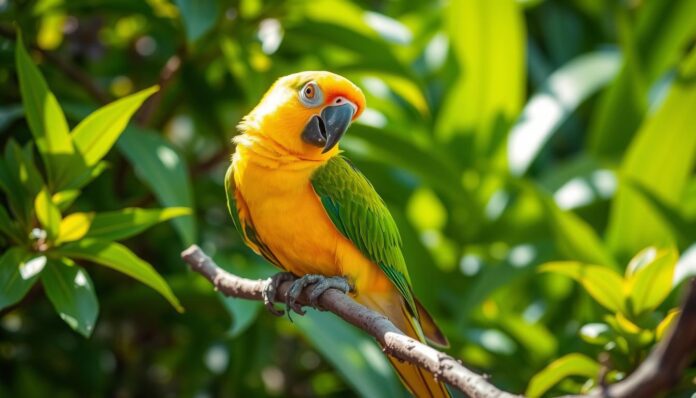Did you know white-bellied caiques can live up to 40 years in captivity? They are known as “the clowns of the parrot world” for their playful nature. These birds are full of energy and love to play, making them great pets for those looking for something special.
Caiques are small, weighing about 180 grams and measuring 9 inches long. They are found in South America, including Colombia, Ecuador, and Brazil. Their bright colors and intelligence make them entertaining to watch and interact with.
Introduction to Caique Parrots
Caique parrots come from South America’s lush forests. They are known for their bright colors and fun nature. These birds are small, about 9-10 inches tall, and come in two types: White-bellied and Black-headed Caiques. They have a mix of yellow, green, white, and orange feathers, making them stand out.
Origins and Natural Habitat
Caique parrots live in South America’s tropical areas. Their homes are in the Amazon Basin and nearby. These brazilian parrots love the dense rainforests. They spend their days looking for fruits, nuts, and plants to eat.
Species Varieties
- White-bellied Caique: They have white bellies and bright yellow crests. The White-bellied Caique is a favorite among caique species fans.
- Black-headed Caique: They are known for their black heads and necks. The Black-headed Caique is another beautiful member of the Caique parrot family.
Physical Characteristics
Caique parrots are sturdy and colorful. Both types look similar, with a mix of yellow, green, white, and orange feathers. They are often called “clown-like” because of their playful looks.
The Personality of Caique Parrots: The Clowns of the Bird World
Caique parrots are known for their lively and playful nature. They are called the “clowns of the bird world” because of their fun antics. Caique personality is full of energy, mischief, and a need for attention, making them a joy to have around.
These birds love to dance, play, and jump around. They play like puppies, climbing, swinging, and doing funny tricks. They are always looking for ways to entertain their owners and have fun together.
- Caiques are very social and loving, forming close bonds with their owners.
- They are smart birds that can learn many tricks and commands.
- Caiques are vocal, often talking and chattering with their owners.
- Even though they are full of energy, caiques can also be gentle and love to cuddle.
The special personality of caique parrots makes them stand out. They are a favorite among pet owners who want a lively and loving bird. With their fun antics and loving nature, caiques are sure to win the hearts of those who welcome them home.
| Characteristic | Description |
|---|---|
| Energy Level | High-energy, active, and mischievous |
| Personality | Playful, attention-seeking, and entertaining |
| Socialization | Highly social, forming strong bonds with owners |
| Intelligence | Intelligent, easily trained to perform tricks |
| Vocalizations | Vocal, engaging in animated conversations |
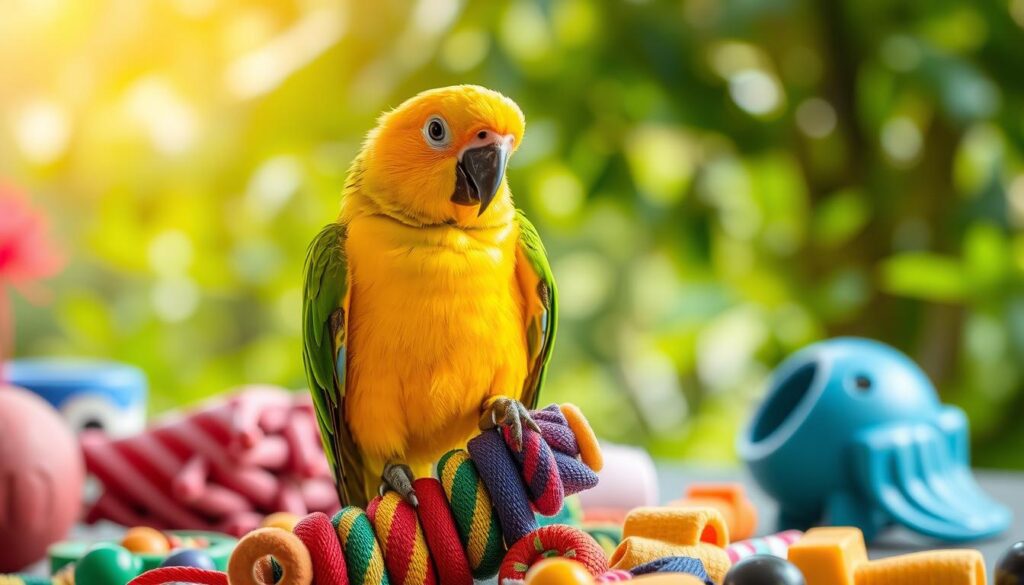
Size and Life Expectancy of Caiques
Caique parrots are small, standing about 9-10 inches tall. They live a long time, up to 25-30 years in captivity. Their size and long life make them great pets for those with less space.
Adult Size and Weight
The caique lifespan and their parrot size make them popular pets. They weigh about 165 grams and have a 36 centimeter wingspan. This size is perfect for people living in small spaces.
Average Lifespan in Captivity
In captivity, caiques can live up to 40 years. The longest recorded life was 26 years. With good care, they can be pets for many decades.
Growth and Development Stages
- Caique chicks hatch with variable coloration, featuring a white breast suffused with yellow and orange, and brown eyes.
- As they mature, caiques develop their distinctive orange, yellow, and green feather patterns, reaching full adult plumage around 2-3 years of age.
- Caiques are considered sexually mature and capable of breeding at around 2-3 years old, with annual breeding cycles thereafter.
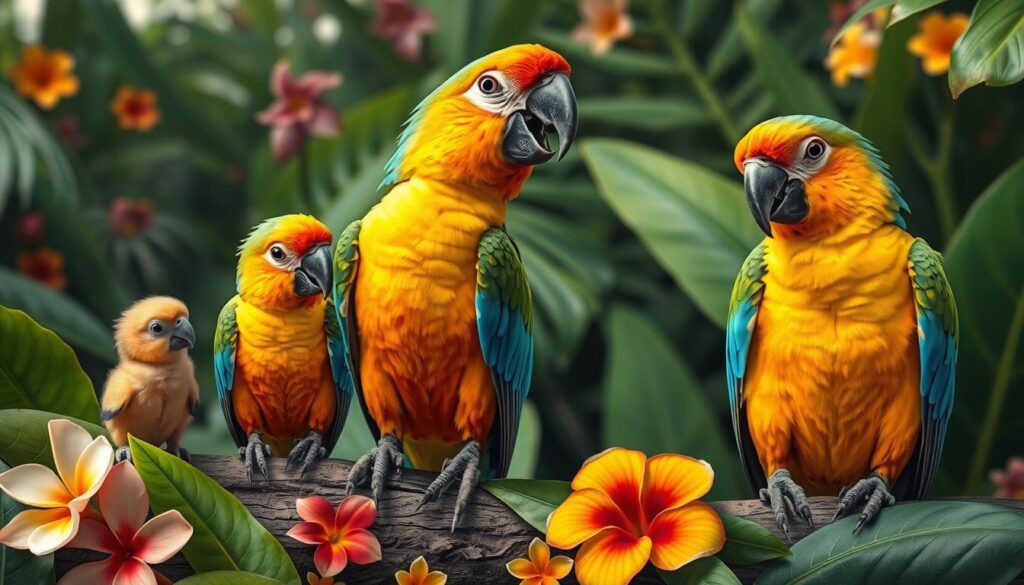
The caique lifespan and the parrot size of these vibrant birds make them a popular choice among avian enthusiasts. With their compact stature, playful personalities, and impressive longevity, caiques continue to captivate bird lovers around the world.
Housing Requirements and Cage Setup
Caique parrots are full of energy and love to play. They need a lot of room to move around and explore. A small space can make them stressed and cause bad behavior.
The best cage for a caique should be at least 3 feet by 3 feet by 3 feet. This size gives them enough room to jump, flap, and play. The cage must be strong and safe, made from materials like stainless steel. Make sure the bars are close together to prevent escape or getting stuck.
Inside the cage, add wooden perches of different sizes. This lets the caique exercise its feet and claws. Natural branches or rope perches are great because they’re comfy and help wear down the beak and nails. Also, include toys and chew-proof items to keep the caique’s mind active and entertained.
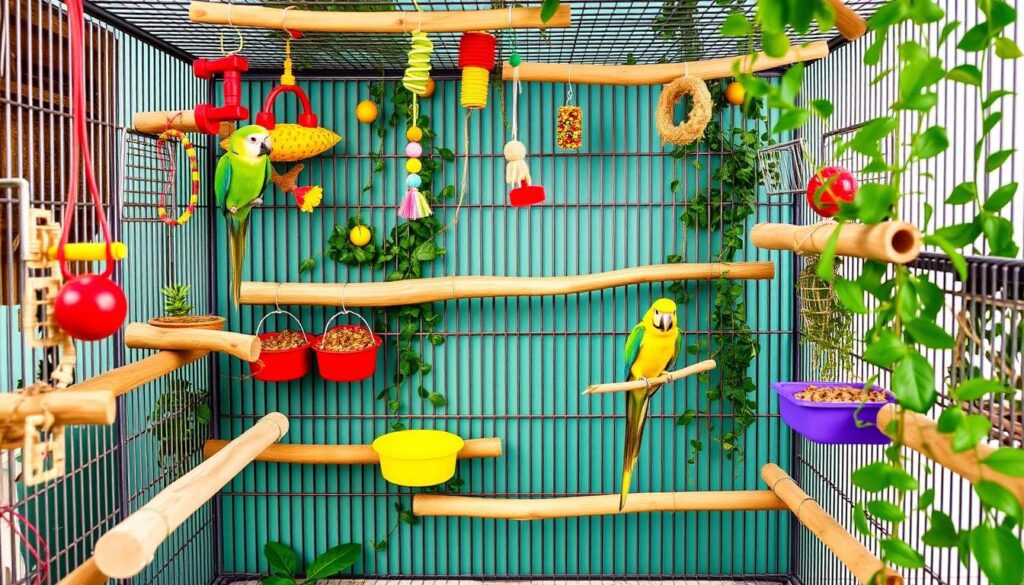
The caique’s bird housing needs good air flow, light, and temperature control. Use stainless steel or ceramic dishes for food and water because they’re easy to clean. The cage should also have a lining that’s easy to clean, like wood shavings or newspaper.
By giving your caique a big, fun, and clean caique cage, you make sure they’re happy and healthy. This is key for their well-being and happiness.
Diet and Nutrition Essentials
Caique parrots need a diet full of variety and balance to stay healthy. A diet of only seeds can cause nutritional problems. So, their diet should include high-quality pellets, fresh fruits, veggies, grains, and proteins.
Daily Dietary Needs
A good parrot nutrition for caiques includes:
- 60-80% complete or pelleted food, packed with vitamins, minerals, and nutrients
- 20-40% fresh produce, like kale, broccoli, spinach, carrots, and sprouts
- Occasional treats like nuts, cooked egg, or Parrot Cafe treats
Recommended Foods and Supplements
Along with a quality pelleted diet, caiques also benefit from:
- Lafeber NutriBerries, packed with 40 essential nutrients
- Sprouted seeds, soaked in warm water for a couple of days
- Nuts like walnuts, macadamia nuts, and palm nuts
- Supplements like calcium to support bone and eggshell health
Foods to Avoid
Some foods are bad for caiques and can be toxic or cause health problems, including:
- Avocado
- Chocolate
- Onions and garlic
- Caffeine and alcohol
- Salty or sugary snacks
It’s key to give your caique a varied, balanced diet and make sure they drink enough water. This helps keep them healthy and happy.
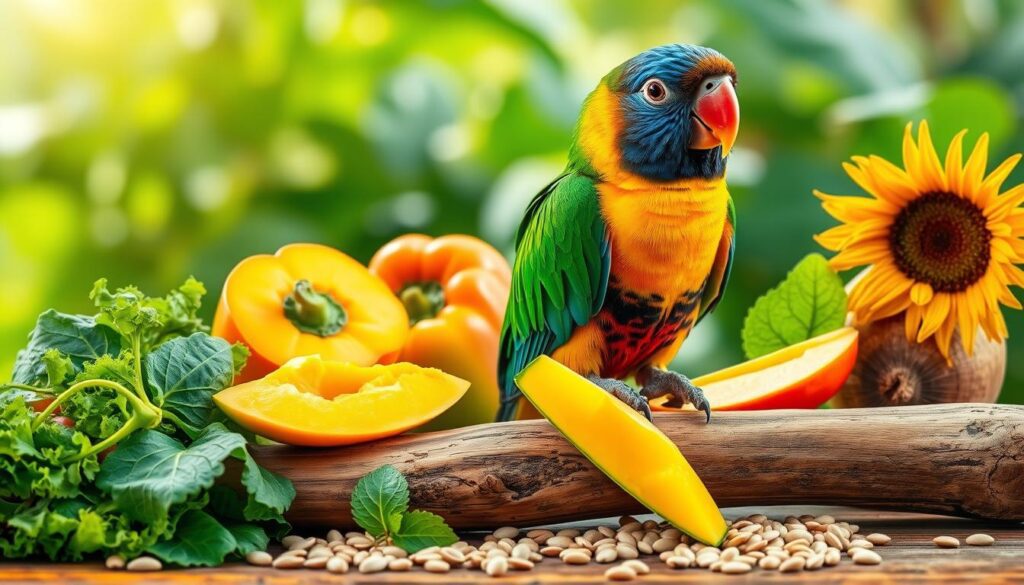
Exercise and Entertainment Needs
Caique parrots are very active and need lots of mental and physical play. They need at least two hours of playtime with their owners every day. They love to chew and play with different toys.
These birds are always curious and love to explore. They can turn anything into a toy, like ropes, bells, or cardboard boxes. But, they get bored with toys fast, so they need new ones often.
- Caiques require a minimum of 2 hours of daily playtime and interaction with their owners
- They enjoy a wide variety of caique toys that allow for chewing, shredding, and manipulating
- Frequent toy rotations are essential to keep these intelligent birds mentally stimulated and engaged
| Statistic | Value |
|---|---|
| Percentage of clients keeping a pair vs. just a single bird | 1% |
| Recommendation for number of Caiques for new parrot parents | Get 1 to focus on training, but can add another later |
| Preferred sex recommendation for Caiques | Female, known to be less aggressive |
| Clients regretting having two birds | Fewer regrets on having two birds, more on doubts about the first bird |
For a good bird exercise routine, caique owners should give them supervised time outside their cage. This lets them explore a safe room or play area. It also helps them bond with their owners.
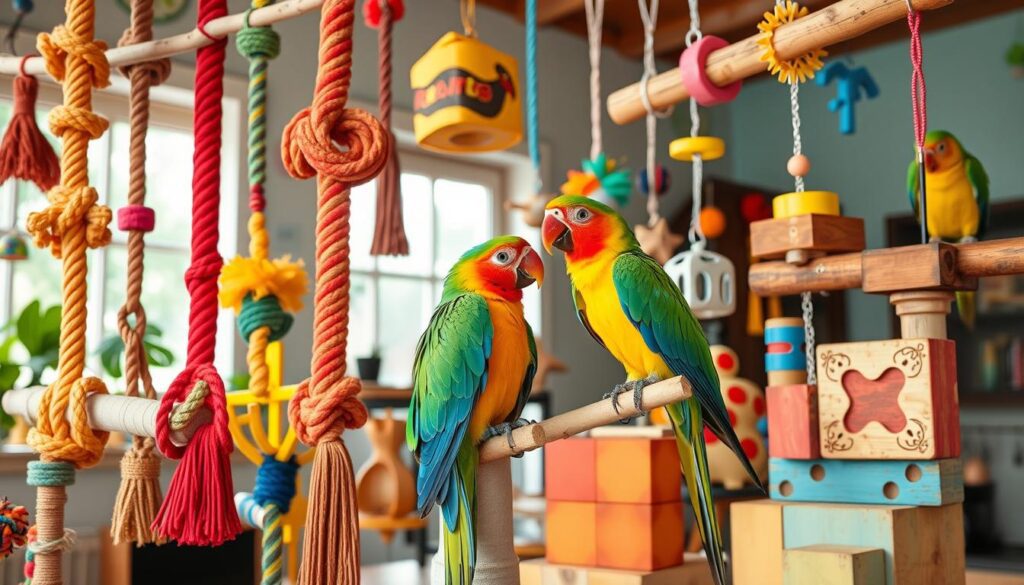
Social Behavior and Interaction
Caique parrots love to be around their owners and need lots of interaction. They are smart and fun, but can be a bit aggressive at times. They might not get along with other birds, even in the same house.
Bonding with Owners
Caiques love to be the center of attention. They form strong bonds with their owners. But, they can get anxious if left alone for too long.
It’s important to train them well. This helps build a strong, trusting relationship.
Interaction with Other Pets
Caiques can be mean to other birds, even their own kind. It’s best to keep them alone to avoid fights. Training can help, but they’re not always good with other birds.
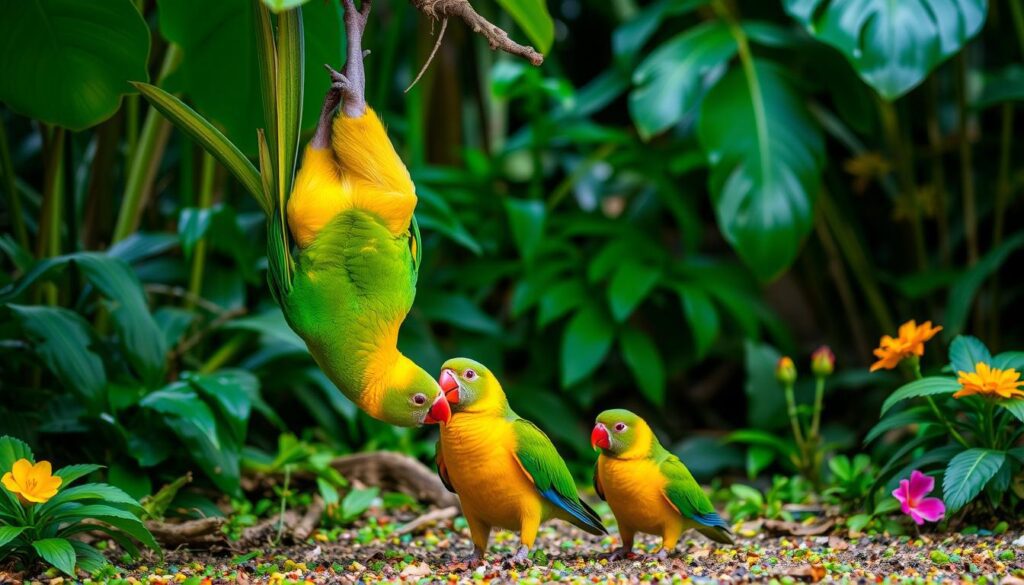
| Characteristic | Description |
|---|---|
| Bonding with Owners | Caiques form strong emotional connections with their owners and thrive on regular interaction and attention. They may develop separation anxiety if left alone for extended periods. |
| Interaction with Other Pets | Caiques are often aggressive towards other birds, even within the same species, and may not get along well with other avian companions. Proper socialization and training are critical for managing their behavior. |
Caique parrots need a balance of socialization and training. Owners must be ready to spend time and effort. This ensures they have healthy relationships with their owners and other pets.
Common Health Issues and Care
Being a responsible parrot owner means keeping a close eye on your caique’s health. It’s important to take them to veterinary check-ups with an avian specialist regularly. Caiques might start feather plucking if they don’t get enough mental stimulation and physical activity.
Caiques are usually healthy birds, but they can face common health problems. Keeping their diet, hygiene, and environment right is vital. They might get respiratory infections, obesity, and viral diseases like Psittacine Beak and Feather Disease (PBFD).
To keep your caique healthy and long-lived, working with a skilled parrot veterinary care expert is key. They can give you advice on how to prevent problems and handle any issues that come up.
- Caiques may be prone to feather plucking if not properly stimulated
- Common parrot health issues include respiratory infections, obesity, and viral diseases
- Regular veterinary check-ups with an avian specialist are critical for caiques
By being watchful and creating a caring environment, you can help your caique stay healthy and live a long life. Getting help from an experienced parrot veterinary care professional is a big step in keeping your feathered friend happy and healthy.
Training and Behavioral Management
Caique parrots are known for their smarts and fun nature. They are great for training. But, their high energy and short focus can be tough for owners. It’s key to train them regularly and set clear rules to manage their behavior.
Basic Training Techniques
Positive reinforcement works best for training caique parrots. Give them treats, praise, or their favorite toys when they do something good. Clicker training, which uses a small device to mark good actions, is also very effective.
Caiques do best with short, frequent training sessions. Start with short times and slowly add more as they get better. This keeps them interested and happy to learn.
Addressing Behavioral Problems
Caique parrots can change mood quickly, going from loving to angry fast. This can cause problems like too much screaming or biting. It’s important to tackle these behavioral problems with training, enrichment, and expert advice.
Talking to a certified parrot behavior consultant is very helpful. They can offer specific advice to help owners and caiques live together happily.
Grooming and Maintenance
Caring for a caique parrot is more than just food and a cozy home. These smart, fun birds need regular grooming to stay healthy. Owners must pay close attention to their grooming needs, from baths to nail trims.
Bathing and Feather Care
Caique parrots love to bathe and might choose water bowls over spray bottles. Shallow dishes or a gentle spray can help them bathe naturally. It’s also important to check their feathers for damage or color changes and gently groom them if needed.
Nail and Beak Trims
Caique parrots’ sharp, curved beaks and nails need regular trimming to avoid health problems. Learning how to trim their nails and beaks safely is key. If unsure, it’s best to ask an avian vet or a skilled groomer for help.
Cage Maintenance
Keeping a caique parrot’s home clean is vital for their health. Owners should clean the cage often, change soiled bedding, and disinfect it regularly. This prevents harmful bacteria and keeps their feathers and skin healthy.
| Grooming Task | Frequency |
|---|---|
| Bathing or Misting | 2-3 times per week |
| Nail Trimming | Every 4-6 weeks |
| Beak Trimming | Every 6-8 weeks |
| Cage Cleaning | Daily spot cleaning, full cleaning 1-2 times per week |
By sticking to a grooming routine and keeping their environment clean, caique parrot owners can keep their pets healthy and happy.
Cost of Ownership and Initial Investment
Caique parrots are amazing pets that bring joy and laughter. But, owning a caique comes with a big price tag. It’s important for future owners to know the costs to give their bird the best care.
Purchase Price Range
Buying a caique can cost between $500 and $1,500 or more. This depends on the bird’s age, color, and where you buy it. Rare colors can be even pricier. You’ll also need to buy a cage, toys, and other things for your bird.
Ongoing Expenses
- Food and Supplies: A good diet for a caique can cost over $300 a year.
- Veterinary Care: Regular vet visits and treatments for health issues can cost hundreds each year.
- Cage Upgrades: As caiques grow, they might need bigger cages or aviaries, adding to the cost.
- Toys and Enrichment: Caiques need lots of toys and activities to stay happy and healthy, costing $50 or more a year.
With a lifespan of up to 30 years, owning a caique is a big financial commitment. Before getting a caique, think carefully about if you can afford it for the long term.
Conclusion
The caique parrot is a captivating exotic pet bird. They bring joy and companionship to the right owner. Their charming personalities and playful antics make them wonderful additions to a loving home.
But, owning a caique is a big commitment. They need special care to be happy and healthy. This includes a lot of attention, exercise, and mental stimulation.
They thrive in spacious, enriched environments. A balanced, high-protein diet is also key. Training and socialization can be challenging, but with patience and consistency, they can learn.
For those ready to make a long-term commitment, caique parrots can be incredibly rewarding. Understanding their needs and challenges helps create a loving home for these delightful birds.
FAQ
What are caique parrots known for?
Caiques are called the “clowns of the parrot world.” They are full of energy and love to play. They seek lots of attention and enjoy doing acrobatics like hanging upside down.
What are the different species of caique parrots?
There are two types of caique parrots: the White-bellied Caique and the Black-headed Caique. Both have bright colors like yellow, green, white, and orange.
What are the physical characteristics of caique parrots?
Caiques are about 9-10 inches tall and have a sturdy build. They have bright feathers and come from South America.
How long do caique parrots live?
Caique parrots can live up to 25-30 years in captivity.
What are the housing requirements for caique parrots?
Caiques need a big aviary or cage with wide bars. The space should have many wooden perches for them to hop and chew. They need lots of room to play and move around.
What kind of diet do caique parrots need?
Caiques need more than just seeds. They should eat high-quality pellets and fresh fruits and veggies. Seeds alone can cause nutritional problems.
How much exercise and mental stimulation do caique parrots need?
Caiques are very active and need lots of playtime. They should get at least two hours of attention every day. They love toys, but they can turn anything into a plaything.
How do caique parrots interact with their owners?
Caiques bond strongly with their owners. They can be very affectionate but may also show aggression, like during hormonal periods. They might not get along with other birds.
What are some common health issues in caique parrots?
Caiques might pluck their feathers if bored. They are generally healthy but can get sick like any parrot. Keeping them active and well-fed helps them stay healthy.
How trainable are caique parrots?
Caiques are smart but hard to train because of their energy and short focus. They can quickly change from loving to aggressive. Consistent training and setting boundaries are key.
What is the cost of owning a caique parrot?
Buying a caique can be expensive. You’ll also spend money on food, toys, vet visits, and cages. Owning a caique is a big financial commitment for many years.


